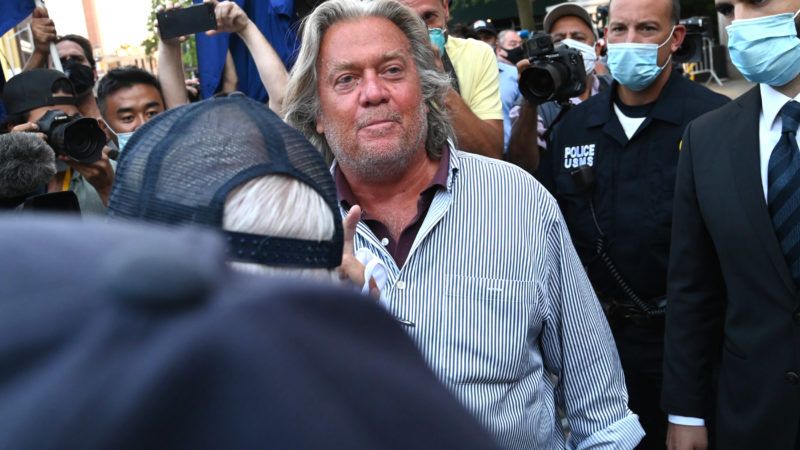Wall Funding Scandal Exposes Steve Bannon's False Populism
Bannon, who says he stands for the little guy, was just charged with stealing over $1 million from donors who thought they were helping to build a border wall.

Steve Bannon, former chief strategist to President Donald Trump, has been charged with defrauding donors to We Build the Wall, a private fundraising effort partially spearheaded by Bannon that collected donations in order to pay for portions of a U.S.-Mexico border barrier. Bannon built his public persona by amplifying anti-immigrant and pro-populist sentiments, first on Breitbart News, and then as Trump's right-hand man during the 2016 campaign. Prosecutors now allege he fleeced his fellow America Firsters out of more than $1 million, which he then used to pay one of his co-conspirators and to cover his own personal expenses "unrelated to We Build the Wall."
Bannon was indicted Thursday on one count of conspiracy to commit wire fraud and one count of conspiracy to commit money laundering.
As the executive chairman of Breitbart News following the death of site founder Andrew Breitbart, Bannon shaped the outfit's nativist stance—with stories on things like "scary descriptions of refugees"—and called it "the platform for the alt-right" in a 2016 interview. He would go on to become one of the architects of Trump's travel ban aimed at Muslim-majority countries. And though the Trump administration has said on various occasions that it supports a legal immigration program, Bannon called legal immigration "the real beating heart of [the] problem."
In addition to encouraging nativist discontent, Bannon has branded himself as one of America's most prominent populists, bucking the establishment, in theory, to assist the Little Guy. The indictment against Bannon calls into question his dedication to advancing his goals, considering he allegedly deceived his fellow patriots for the sake of financing a lavish personal life.
Bannon, who was found and arrested Thursday morning on a $35 million yacht belonging to a close associate, has already called the indictment a "political hit job." A few figures on the right have followed suit, including Fox News host Lou Dobbs, who characterized it as a "deep state plot," and Jenna Ellis, a Trump 2020 campaign adviser, who tweeted it was "yet another malicious political prosecution," referring to the growing list of close Trump aides who have faced criminal charges.
Yet the indictment describes an ornate plot set in motion by Brian Kolfage, Andrew Badolato, Timothy Shea, and Bannon, who used the fundraising ruse to regularly siphon large sums of money from people who believed that 100 percent of their donations would go toward construction and that the campaign organizers indicted this week were volunteering their time and resources without payment. The project raised a total of $25 million and, according to the campaign's website, 100 miles are "ready to be built." Though under five miles of border fencing has actually been erected, the site reads "Promises Made, Promises Kept."
Bannon claimed this week that the prosecution was motivated by politics. "This entire fiasco is to stop people who want to build the wall," he said as he left the federal courthouse in Manhattan on Thursday, though Bannon himself was one of the primary obstacles standing in the way of his project's success.
If convicted, Bannon faces up to 40 years in prison, but his actual sentence will likely not come close to that statutory maximum penalty. The average federal sentence for wire fraud in 2019 was around two years, a range that's stayed relatively consistent over the last decade. For money laundering, the average sentence falls around 75 months or a little over six years.


Show Comments (336)